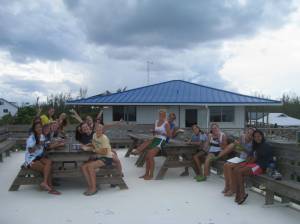by Caciques Lincoln Zweig and Jamie Perritt
Today was a long day of classes. The day started off with two intense workouts. The runners ran an extended loop and the swimmers swam sprint interval loops off of girl’s dorm beach. After these workouts we had a wonderful breakfast, as usual! After a morning packed with invigorating harkness discussions about race in America and the Bahamas we ate lunch. Twas great. Today marked the midterm of research. Each research group presented to each others teachers and advisors. The presentations were wonderful. Every single research group did an astounding job. We were finally able to learn about other groups projects and their goals for the rest of the semester. Each project was thoughtful and well rehearsed. This was one of the first times we have seen each other in such a formal environment. We look forward to hearing more about hearing about the final stages of the research process at parents weekend and beyond. It was a magnificent day.


